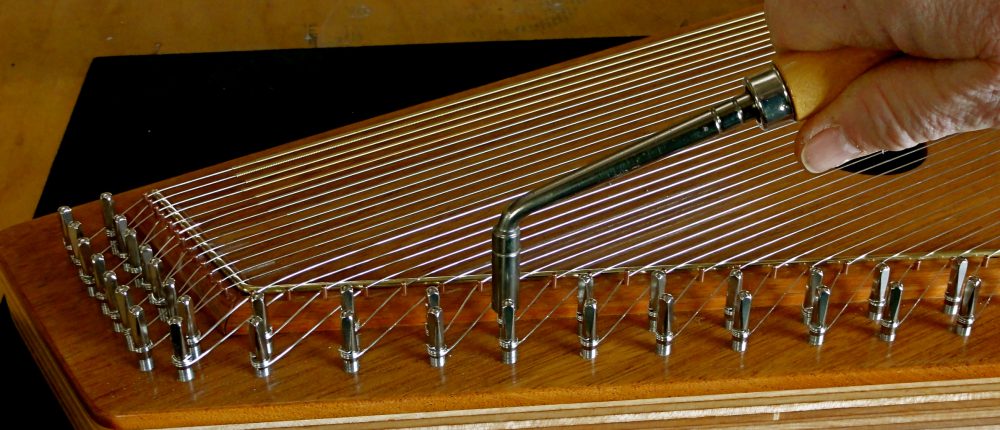 Here is a new custom thirty-seven string chromatic autoharp that I built for a beginning autoharp musician here in Ohio. She plans to play worship and folk music to accompany herself and other vocalists. Because she resides within easy driving distance to Darke County, she and her husband could visit, view the many features and options available, and order the special instrument that is to be a birthday gift from her family.
Here is a new custom thirty-seven string chromatic autoharp that I built for a beginning autoharp musician here in Ohio. She plans to play worship and folk music to accompany herself and other vocalists. Because she resides within easy driving distance to Darke County, she and her husband could visit, view the many features and options available, and order the special instrument that is to be a birthday gift from her family.
 I always try to make each of my instruments unique so that my clients have a special instrument unlike any other. Of course there are constraints like scale, setup, and structure, but I like to give folks choices. This musician chose a western red cedar soundboard, maple chord bars, and curly cherry for the bridges, bar holders, buttons, and side trim.
I always try to make each of my instruments unique so that my clients have a special instrument unlike any other. Of course there are constraints like scale, setup, and structure, but I like to give folks choices. This musician chose a western red cedar soundboard, maple chord bars, and curly cherry for the bridges, bar holders, buttons, and side trim.
 A weeping heart was chosen for the sound hole. I made this by inlaying a 1/8″ thick cherry heart shape into the 1/4″ thick soundboard and then removing the inner heart shape leaving a 1/8″ wide cherry border.
A weeping heart was chosen for the sound hole. I made this by inlaying a 1/8″ thick cherry heart shape into the 1/4″ thick soundboard and then removing the inner heart shape leaving a 1/8″ wide cherry border.

The tailpiece is carved from curly cherry. It covers the anchor end, the exposed ball ends of the strings, and the mounting plate of the fine tuner assembly. The gentle curves on the end corner make the instrument more comfortable to rest in the lap while playing.
 The fifteen maple chord bars feature cherry buttons with the lateral dishing (rather than longitudinal dishing) preferred by the player. They move on #6 steel pins set into Delrin bases. The chord felt is yet uncut pending the player’s preferences.
The fifteen maple chord bars feature cherry buttons with the lateral dishing (rather than longitudinal dishing) preferred by the player. They move on #6 steel pins set into Delrin bases. The chord felt is yet uncut pending the player’s preferences.
 Structurally, this A style autoharp is built with a one piece laminated pinblock frame and a 1/4″ thick laminated birch back. Lately, I have been routing away unnecessary areas inside the frame to increase the interior volume. This, along with some tuned bracing, improves tone and volume.
Structurally, this A style autoharp is built with a one piece laminated pinblock frame and a 1/4″ thick laminated birch back. Lately, I have been routing away unnecessary areas inside the frame to increase the interior volume. This, along with some tuned bracing, improves tone and volume.
The custom thirty-seven string set was made by Greg Schreiber and is tuned in standard chromatic order from F2 to D6. Daigle fine tuners anchor the strings at the tail end. These well designed fine tuners have only one moving part per string, a hex screw that permits the fine pitch adjustment that is difficult to attain with the tuning wrench.

You must be logged in to post a comment.